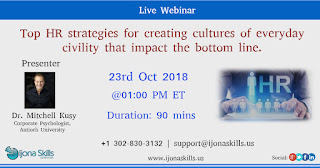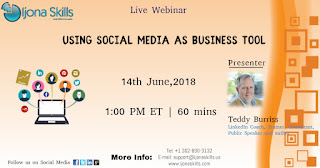Top HR strategies for creating cultures of everyday civility that impact the bottom line.
IjonaSkills - HR Management Training
Overview
"They are often known as narcissists, bullies, and clever chameleons who knock down, but kiss up," said Dr. Mitchell Kusy, author of his newly released book, Why I Don't Work Here Anymore: A Leader's Guide to Offset the Financial and Emotional Costs of Toxic Employees. They shame, manipulate, and belittle in public and private as their modus operandi. Working with organizational leaders, HR feels the angst they cause, but are often unaware of how prevalent they are or how much they cost-in terms of money and team performance. What can HR do to both deal with them once they are in your organization, as well as how to prevent these Dr. Jekyll and Mr. Hydes from ever entering your company?
In this webinar, you will understand how Dr. Kusy's extensive 3-year national study of over 400 individuals provides critical answers for HR. Mitch's heavily researched Toxic Cost Worksheet will demonstrate how HR can determine the financial ramifications of toxic people in you own organizations-up to 6% of total compensation costs and use this to sell to leaders why the buck stops here.
Beyond financial costs, Mitch provides innovative and simple HR recruiting practices to avoid hiring these narcissistic personas in the first place. And what about those 51% of employees who are likely to quit because of a toxic person? Stay tuned for his innovative use of the exit interview that will provide you with newly found evidence for successful actions!
He tackles the two top questions he has received from HR: How do I handle a toxic boss? How do I help organizations design cultures of everyday civility that mean business?
Strategies are easier when your toxic person has performance problems. But what about those toxic individuals who are your organizational stars? Mitch shares how giving feedback to a toxic star is painful, but it can be done quite effectively. He concludes this webinar by demonstrating how to integrate these strategies into daily practice-building new norms of respectful engagement that offset toxic behaviors. Positive organizational cultures are designed one strategy and one person at a time. He relates this through rich examples, robust practices, and clear strategies-all formed from research and evidence-based methods.
Why should you attend?
HR practitioners are the key professionals who have the opportunities to coach leaders on helping them deal with toxic behaviors and create organizations of everyday civility. In addition, if HR professionals want to have the hard data to demonstrate to leaders that now is the time to do something about toxic personalities and the significance of everyday civility on the bottom line, this is the webinar for you!
- Please click on the following link to purchase the Dr. Mitchell Kusy's latest book Why I Don't Work Here Anymore
Areas Covered in the Session:
- 92% of employees rated the range of severity of toxic work behaviors 7 to 10 on a 10-point scale: How can HR reduce the severity of these behaviors?
- 94% of employees have work with a toxic person in the past 5 years: What are best practices for HR intervention?
- 87% reported that team climate worsened: How can HR assess team climate with a simple and innovative assessment tool?
- 51% of your organization's top talent is likely to quit because of a toxic person: What are top HR strategies to reduce this turnover?
- 90% of your customers who witness a toxic interchange between two employees tell others: How can HR prevent the erosion of your business?
- 6% of individuals impacted by a toxic person ever filed a formal complaint: What can HR do to increase this low reporting percentage?
Who can Benefit:
- HR leaders and practitioners
- Leadership coaches
- Talent development professionals
- Organization development practitioners




Comments
Post a Comment